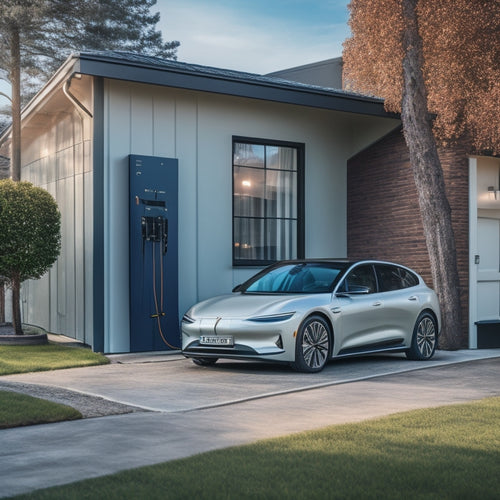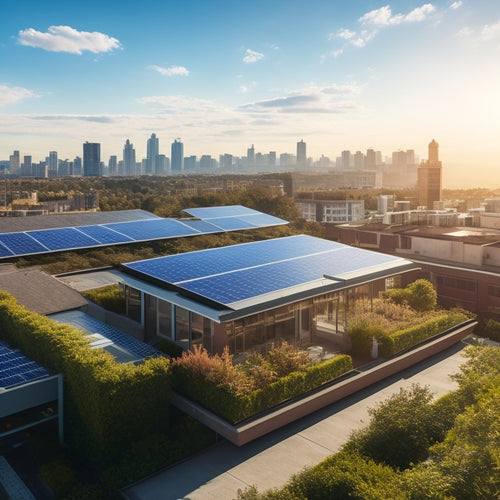
Typical Solar Panel Installation Costs for Homeowners
Share
You can expect to pay between $15,000 to $30,000 for a typical residential solar panel installation, with the average cost per watt ranging from $2.50 to $3.50. System size plays a significant role in determining costs, with larger systems leading to greater energy savings and faster ROI. Factors like installation complexity, local labor rates, and equipment type also impact pricing. To better understand the costs, it's crucial to evaluate the breakdown of expenses, including panel quality, inverters, and labor. As you investigate your options, you'll find that knowing the complexities of solar panel installation costs will help you make an informed decision that suits your energy needs and budget.
Key Takeaways
- National average installation costs for residential solar panel systems range from $15,000 to $30,000, or $2.50 to $3.50 per watt.
- Typical residential systems are 5,000 to 10,000 watts, costing between $12,500 and $35,000, with larger systems leading to greater energy savings and faster ROI.
- Solar panels account for 60% to 70% of total installation costs, with inverters and mounting hardware making up 15% to 20%, and labor and installation comprising 10% to 15%.
- Average cost per watt installed ranges from $2.50 to $3.50, with larger systems benefiting from economies of scale, reducing cost per watt.
- Local incentives and rebates, such as state programs, federal tax credits, utility company rebates, and local government grants, can significantly reduce overall installation costs.
National Average Installation Costs
As you research solar panel installation, understanding the national average installation costs is essential to determining your return on investment. The national average cost of solar panel installation ranges from $15,000 to $30,000, depending on the size of the system and the quality of the equipment.
However, it's not just the upfront cost you need to evaluate - you'll also need to factor in installation financing, maintenance expenses, and potential repairs.
When calculating your total costs, evaluate the following: the average cost per watt is around $2.50 to $3.50. For a typical residential system, you're looking at around 5,000 to 10,000 watts, which translates to $12,500 to $35,000.
Keep in mind that these costs can vary depending on the complexity of the installation, local labor costs, and the type of equipment used.
While these costs may seem steep, remember that solar panels can save you money in the long run by reducing your energy bills and increasing your property value.
Factors Affecting Solar Panel Prices
You've got a good understanding of the national average installation costs, but now it's time to drill down into the specifics. Several factors affect the final cost of your solar panel installation, and it's crucial to understand them to get an accurate estimate.
Firstly, the type and quality of solar panels you choose play a significant role in determining the overall cost. High-efficiency panels with advanced solar technology advancements, such as bifacial or PERC cells, tend to be more expensive than standard modules.
Additionally, the installation company reputation and their level of proficiency can impact the final bill. Reputable companies with experienced installers may charge more than smaller, less-established firms.
Other factors, such as your roof's size, complexity, and orientation, can also influence the installation cost. The number of panels required to meet your energy needs, local building codes, and permits can add to the overall expense.
Cost Breakdown of Solar Systems
With the factors affecting solar panel prices in mind, it's essential to understand how these costs break down in a typical solar system installation. This knowledge will help you make informed decisions when exploring financing options and planning your installation timelines.
| Component | Typical Cost Range |
|---|---|
| Solar Panels | 60% - 70% of total cost |
| Inverters and Mounting Hardware | 15% - 20% of total cost |
| Labor and Installation | 10% - 15% of total cost |
As shown in the table above, the bulk of the cost comes from the solar panels themselves, which can account for up to 70% of the total installation cost. Inverters and mounting hardware make up the next largest portion, followed by labor and installation costs. Understanding this breakdown will help you prioritize your spending and make the most of your investment. By knowing what to expect, you can better plan your solar panel installation and take advantage of available financing options to make your shift to renewable energy as smooth as possible.
Average Cost per Watt Installed
When you're evaluating solar panel installation costs, you need to take into account the average cost per watt installed.
This metric is vital because system size matters, and it directly impacts the overall expense.
The price per watt range typically falls between $2.50 and $3.50, but it can vary depending on the system's size and other factors.
System Size Matters
The scale of your solar panel system considerably impacts the overall installation cost, as larger systems typically benefit from economies of scale. This means that if you need to power a larger home or have higher energy demands, you may be able to take advantage of lower costs per watt.
Here's how system size affects your installation costs:
-
Larger systems are more efficient: A larger system can produce more power while taking up a similar amount of space, resulting in higher solar panel efficiency.
-
Faster installation timeline: Larger systems often require more equipment and labor, but the installation timeline may be shorter due to the economies of scale.
-
Lower cost per watt: As system size increases, the cost per watt installed typically decreases, making larger systems a more cost-effective option for homeowners with higher energy needs.
Price Per Watt Range
You'll likely pay between $2.50 and $3.50 per watt for a solar panel system, which translates to $15,000 to $21,000 for a typical 6-kilowatt residential system. This price per watt range is a key factor in determining the overall cost of your solar panel installation.
| System Size (kW) | Total Cost Range |
|---|---|
| 3 kW | $7,500 - $10,500 |
| 4 kW | $10,000 - $14,000 |
| 5 kW | $12,500 - $17,500 |
| 6 kW | $15,000 - $21,000 |
| 7 kW | $17,500 - $24,500 |
Keep in mind that price fluctuations can occur due to various factors, such as the quality of the solar panels, the complexity of the installation, and local labor costs. Additionally, watt efficiency also plays a role in the overall cost, as more efficient panels may be more expensive but provide more power per hour of sunlight. Understanding the price per watt range can help you make an informed decision when selecting a solar panel system that meets your energy needs and budget.
Installation Costs by System Size
When you're considering solar panel installation, you'll want to understand how the system size affects the overall cost.
You'll find that small systems, typically under 5 kilowatts, have higher costs per watt than larger systems.
As you scale up to larger systems, often above 10 kilowatts, the installation costs decrease, leading to a more affordable option for your energy needs.
Small System Pricing
Considering your budget constraints, small solar panel systems can be an attractive option. You can start generating clean energy without breaking the bank. Small systems typically range from 2-5 kilowatts (kW) and are ideal for smaller homes or apartments.
Here are some key benefits of small solar panel systems:
-
Lower upfront costs: Small systems require fewer panels, resulting in lower installation costs. You can expect to pay between $15,000 and $30,000, depending on the system size and quality.
-
Flexibility: Small systems can be easily expanded or upgraded as your energy needs change. This flexibility is particularly useful for homeowners who plan to add more appliances or electric vehicles in the future.
-
Access to solar financing options: Even with lower upfront costs, small systems may still be out of reach for some homeowners. Fortunately, many solar financing options are available, including loans and power purchase agreements.
Thanks to photovoltaic technology advancements, small solar panel systems are becoming increasingly efficient and affordable.
Large System Costs
While small solar panel systems are ideal for smaller homes or apartments, larger systems are better suited for bigger homes, commercial properties, or those with higher energy demands.
You'll typically need a larger system if you have a large family, multiple electric vehicles, or a home with high energy consumption.
Larger systems can range from 10 kilowatts (kW) to 20 kW or more, depending on your specific energy needs.
The cost of a large system can range from $30,000 to over $60,000, before any applicable tax credits or incentives.
You may want to investigate financing options to make the upfront cost more manageable.
Keep in mind that larger systems also come with higher maintenance expenses, as they've more components that require regular upkeep.
However, larger systems can also lead to greater energy savings and a faster return on investment.
It's crucial to work with a reputable installer to determine the right system size for your needs and budget.
Local Incentives and Rebates
Your local government and utility company may be willing to share the cost of going solar with you. They offer various incentives and rebates to encourage homeowners like you to switch to renewable energy. These perks can markedly reduce your upfront costs, making solar panels more accessible.
Here are three ways you can benefit:
-
State programs and tax incentives: Many states offer tax credits or rebates for homeowners who install solar panels. These incentives can be combined with federal tax credits to maximize your savings.
-
Utility rebates and financing options: Your utility company may provide rebates or special financing options for solar panel installations. These can help you cover a portion of the costs or provide low-interest loans.
-
Local grants and installation assistance: Your local government may offer grants or installation assistance to help homeowners overcome the initial costs of going solar. You'll need to check program eligibility and apply accordingly.
Frequently Asked Questions
Can I Install Solar Panels Myself to Save Money?
You can attempt a DIY installation to save money, but consider the costs of your time, potential errors, and warranty voidance; weigh these against the benefits of professional installation, ensuring ideal energy output and safety.
What Maintenance Is Required for Solar Panels?
You thought saving money on installation meant you'd dodged maintenance costs, but think again! You'll need to schedule regular solar panel cleaning and inspections to guarantee maximum energy output - it's a small price to pay for utilizing the sun's power.
Do Solar Panels Work During Power Outages?
You'll find that solar panels don't provide power during outages with standard grid-tied systems, as they're designed to sync with the grid's frequency. However, you can consider battery backup systems to maintain solar panel efficiency and energy supply during outages.
Can I Add More Panels to My Existing System Later?
You can expand your existing solar panel system later if you choose compatible panels, ensuring seamless integration and maximizing system efficiency, but it's essential to assess your system's expansion options and compatibility before adding more panels.
Will Solar Panels Increase My Property Value?
You'll enhance your property value by installing solar panels, as they're viewed as a desirable upgrade, and you'll reap the benefits of solar incentives, potentially increasing your home's worth and attracting potential buyers if you decide to sell.
Related Posts
-

5 Essential Tips for Buying EV Charging Systems Online
When purchasing an EV charging system online, you'll want to make sure you're making an informed decision. First, det...
-

What You Need to Know About Permits and Inspections
You need to navigate the complex landscape of permits and inspections to guarantee your project complies with local z...
-

What Is the Cost to Put in Solar Panels
You're likely considering solar panels for your home, and the most significant factor in your decision is the upfront...


